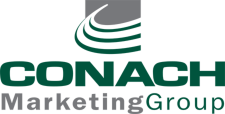Small business marketing program
Developing an affordable small business marketing program
After decades of working with small businesses, I discovered a common mistake they make. When they start their business, they take care of the legal, operational, and financial areas. However, they commonly overlook marketing. In this blog, I will discuss what you need to consider when developing an affordable small business marketing program:
- Can I afford it?
- How do I target the best customers?
- What are the best advertising channels?
- How do I develop sales material?
An affordable small business marketing program
When I talk with prospects, many tell me they can’t afford a marketing program. Well, as a guy that has made his living in marketing for over three decades, my first reaction is “how can you afford NOT to have one”? However, as a business owner, I understand how cash flow, or lack thereof, can cause prospects to ask this question. But, you must remember that if you aren’t marketing your company how will you get sales? A small business marketing program is as much as an investment in your future as new equipment or staff.
Frequently, the day-to-day operations of most businesses take precedence over marketing. However, your brand, lead generation, website, sales material, and social media presence are critical factors in growing or sustaining your business. I have found most business owners realize this fact, but do not have the time, knowledge or expertise to develop a small business marketing program that fits their budget.
Because at Conach, we work with small companies that need business-to-business programs, we have learned how to make the most of limited budgets. Especially in our core focuses of financial marketing, industrial marketing, and construction marketing. But no matter your type of business, I have found these are three critical areas you need to analyze to develop a cost-effective small business marketing program that achieves results.
One: The best target markets to pursue
When I’ve asked clients who their customers are, I often get the reply, “Anyone that needs [insert their particular service or product here].” While this might be true, most small businesses can’t afford to market to ALL your potential customers. As a result, you need to select the ones that are the best customers for your company. Consider the following fundamental factors when deciding which markets to target:
Potential
- Is the activity within a market showing it is growing?
- Is there a great deal of competition in this market?
Profitability
- Is your profit margin higher in that market than others?
- Is this market easy to work with or does it require more time than others?
Proximity
- Does travel or shipping expenses prohibit working with customers outside of a specific sales territory?
- Can you absorb any additional cost to expand your sales territory?
Of course, there are many other questions when targeting a market. But by answering these simple questions, you can quickly identify customers worth targeting. To flesh out your small business marketing program, develop a plan to test the market for 3-6 months. This method allows you to determine if the market is worth further investment. Using this method, most clients find they can afford to target one or two markets.
Two: The best channels to reach prospects
Most business owners are bombarded by various print and media reps wanting to advertise their company. Because they are unsure of the correct ones to choose, they usually select “none of the above.” Before you choose an advertising channel, you need to understand them. With that in mind, let’s look at direct lead generation, target marketing, and awareness advertising from a B2B marketing perspective.
Direct lead generation channels will give you the quickest results for your advertising bucks. Because it is a one-to-one approach, you place your company and its wares directly into the “hands” of potential customers. Tactics such as prospecting calls combined with direct mail to leads or trade shows are considered traditional direct advertising methods. You can also employ e-mail blasts to prospects as a direct lead generation strategy.
Target marketing channels reach groups of potential customers likely to buy what you are selling. These channels include industry-specific online and print advertising, blogs, and social media such as Facebook, Instagram or Twitter.
Search engine optimization is another essential target marketing tactic. Using keywords and long tail keyword phrases, you can drive prospects to your website.
Awareness advertising is meant to build recognition of your brand over time. This strategy can be regional, global or international. Awareness channels include radio, television, billboards, signage, general interest online and print publications.
When implementing an affordable small business marketing program, I recommend direct lead generation. And if the budget allows, add specific target market channels. Simply put, don’t waste money on channels that might reach a prospect, rather spend it on ones that WILL reach them.
Three: building a cost-effective sales toolbox
The worst thing you can tell a prospect that asks for more information is to “visit my website.” Not because your website shouldn’t act as a digital salesperson, it should. However, it’s common sales practice not to ask the prospect to go out of their way to buy from you. For that reason, you should always have sales material ready to respond to a request. You need cost-effective sales material for your small business marketing program that fits into your budget.
I know – it’s cheaper to email a prospect a PDF than send a printed brochure. At Conach, we conduct multiple direct mail and prospecting call campaigns for numerous clients every year. We find that some potential customers still request printed material over emailed material. Consequently, if that is what your prospect wants, then that is what you should send. It is essential to your sales tools convey the right impression and necessary information to engage the contact. Those tools could be company brochures, product spec sheets, line cards, or target market brochures.
That sounds like a lot of printed material. But you can have the material you need without breaking the marketing bank. With today’s digital printing, the days of having to print thousands of pieces are gone. It allows you to print only the quantities you will use digitally. As a result, your printed sales material will presents the proper brand, and you will have the digital material to email.
Final thoughts on developing a small businesses marketing program
Let’s not forget websites; certainly an essential part of any small business marketing program. While there are many platforms for a business to create its own website, should you? While you can save costs doing it yourself, a website must reflect your brand, engage visitors, and conform to Goole criteria to rank well. In addition, some website strategies can work in combination with your advertising and sales efforts. A professional can help assure your website is working for you.
To summarize, here’s my answer to the question, “How can my business afford a sales and marketing program?” First, set a budget you can work within. Second, determine the best answers for your company in the three areas I discussed. Third, find a marketing professional that can help you get the most out of a limited budget. Finally, don’t let the answer be not to do anything, because that is something your business truly can’t afford.
Pappy
Paul Kowalski (or Pappy as he is called around the office) spent over two decades working at other agencies before opening Conach Marketing Group in 2008. The early part of his career was working with Fortune 500 clients at different agencies. However, working with smaller clients was his preference. This choice was because of the impact on a client’s business growth and the forming closer, personal relationships.
When he was creating Conach, his goal was to bring those Fortune 500 strategies along with years of B2B marketing experience to small business marketing clients. As a result of focusing on business to business marketing, Conach specializes in construction marketing, financial marketing, and industrial marketing. Even though we are in Mid-Michigan, Conach provides marketing services to clients across the country.
For more information visit conachmarketing.com or contact us or call 989.401.3202.

